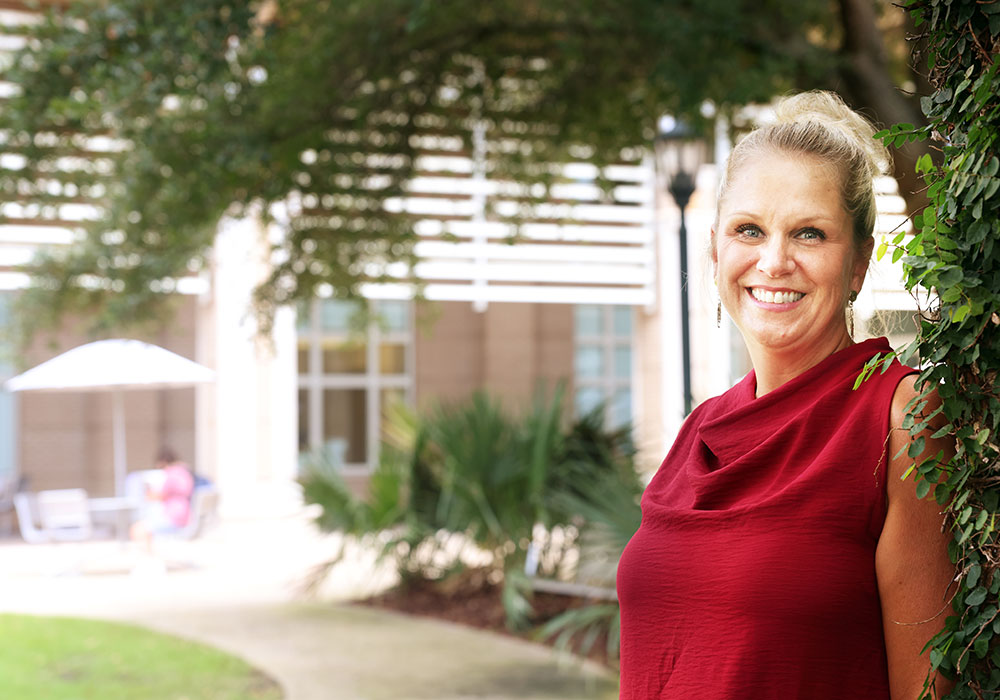When Jessica Seel explains why she loves rural health, she can’t help but talk about the champions.
She recalls the young man who relocated to a small South Carolina town for a substance use treatment and recovery program after being incarcerated and hitting rock bottom. Eventually, that young man turned his life around, and today, he develops programs to help others like him. He’s an inspiration to the people in his adopted hometown, but also to Seel, who sees that same determination in other small towns.
“You have people who have dedicated their lives to their community, who show up for all the events and really care,” says Seel, who earned her master’s degree from the Arnold School of Public Health in 2016. “And that’s what makes me realize I’m in the right place.”
That place is the South Carolina Office of Rural Health, where Seel is director of behavioral health initiatives and workforce development.
More than a quarter of South Carolina residents live in rural areas, and these populations face more challenges than their urban counterparts. For starters, remote communities are often medically underserved, meaning there are fewer providers to go around. Residents have little to no access to public transportation. Wages are lower, job opportunities fewer, and communities experience higher rates of chronic disease, including behavioral health challenges.
For Seel, a typical day might mean working with advocates and other stakeholders to improve access to mental health care, address substance use or recruiting providers — the kind of high-impact work she imagined doing when she came to USC for graduate school in 2014. But her path to the university wasn’t a straight shot. In fact, she didn’t complete her undergraduate degree, a bachelor’s in social work from Columbia College, until age 40. She finished her master’s degree at 42.
She was pulled toward public health long before that, though. Growing up in a lower middle-class home in West Columbia, she came to understand that opportunities could be drastically different, even for those living on the fringes of metropolitan areas. And then shortly after graduating high school, her family was rocked by her father’s suicide, a tragedy that underscored the state’s behavioral health needs and the devastation that can ensue when those needs are not met.
“Seeing disparities in action and seeing them in my own life, I developed this huge passion to advocate for change, to advocate for equality, to advocate for individuals who weren't born into a situation that afforded them the opportunities that others may have,” she says. “Remembering those times and those feelings drove me to this work.”
But grappling with her father’s death meant putting her college plans on hold. In the meantime, she discovered her love of rural health while working her way through the ranks of a health care company, a job that involved interacting with people in small towns across the state. By the time she got to graduate school, she knew she wanted to make a difference in South Carolina’s rural communities; the people and classes at the Arnold School of Public Health showed her how.
Seel’s advisor, professor Daniela Friedman, helped her navigate her return to college. Former professor Heather Brandt taught her how individuals and organizations can solve problems collaboratively. Other faculty members worked alongside her in her first job after graduation, a program coordinator role with the South Carolina Cancer Prevention and Control Research Network.
We need to focus on supporting what's being done instead of trying to change things the way we think they should be changed. We need to go into communities and work with them, not impose our solutions on them. I'm a true believer in that.
“I can't emphasize enough that the programs and classes that I took at USC have transferred to real work experiences,” Seel says. “Oftentimes you hear people say, ‘Oh, I went to school and got this degree, and I never use it.’ I use every single piece of mine in some way, shape or form.”
One of the most important things she has learned is to let the communities take the lead. In South Carolina, the laws and policies that affect rural areas are often made in Columbia. While outsiders might have good intentions, insiders know what’s actually needed.
“We need to focus on supporting what's being done instead of trying to change things the way we think they should be changed,” she says. “We need to go into communities and work with them, not impose our solutions on them. I'm a true believer in that.”
And there’s a lot being done already. She has met champions in communities across the state who are addressing health issues such as opioid use disorder, suicidal ideation and HIV. Others are working to combat the stigma associated with mental illness. Seel’s job is to bring everyone to the table and connect them with the resources to move forward.
“I love cross-pollinating and getting people in communities to work together collectively because having that voice, a collective voice, is powerful,” she says. “I love breaking down barriers, letting different sectors work together, whether it is community members, individuals with lived experience, policymakers or healthcare professionals. It’s about taking away those titles and having them just work as community members collaboratively. That's where real change happens.”
